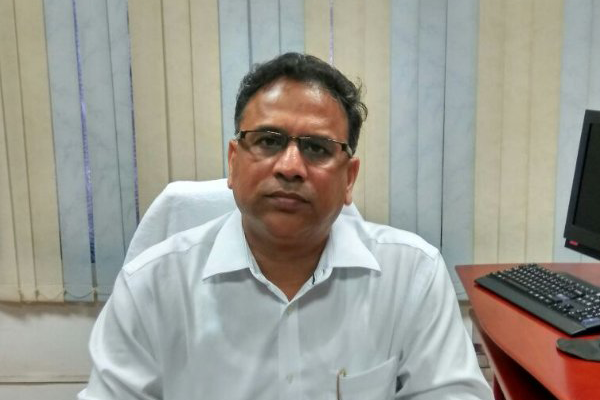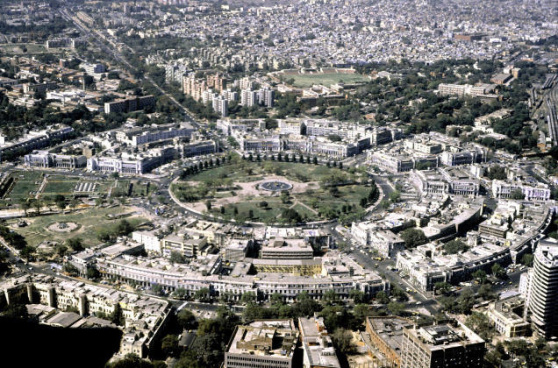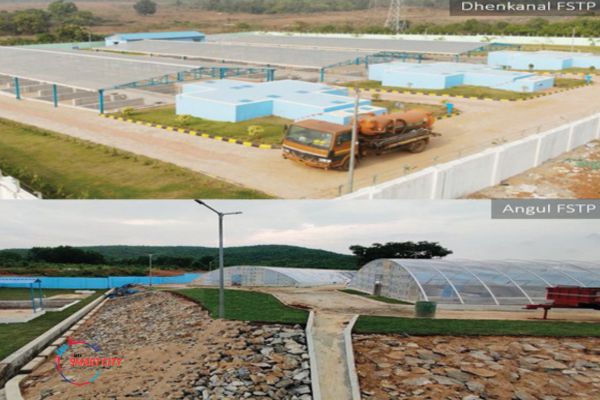
Universal access to safely managed sanitation is a human right, a core public service and a critical element in building resilient cities and empowering communities. However, with the rapid urbanisation India has undergone in the past few decades, it is projected that more than 50% of India’s population will be living in cities by 2030, multiplying the load on existing sanitation systems, potentially making access to safely managed sanitation exceedingly difficult for vulnerable communities.
Between 2014 and 2019, the government massively expanded access to sanitation infrastructure in the form of Individual Household Toilets (IHHTs), Community Toilets (CTs) and Public Toilets under the Swachh Bharat Mission (SBM). While this has greatly improved sanitation coverage, the sustained uptake of services, operation and maintenance of sanitation infrastructure continues to be a challenge. This creates an additional need to go beyond infrastructure and place a focus on usage, behaviour shifts and engagement with communities to create a safe and equitable sanitation ecosystem. Involving vulnerable communities in decision-making processes especially including women, urban poor communities and minority communities makes community participation indispensable in reaching the last mile with sustained, equitable, quality services.
The Historic Success of Community Participation in Urban WSH Programmes & Swachh Bharat Mission
Over the last few decades, community engagement in Urban Water, Health and Sanitation (WSH) has been gaining significance. Community engagement or community participation means involving stakeholders meaningfully in decisions which primarily affect them, not only ensuring their inclusion in decision-making roles, but also empowering them through livelihood opportunities. In India, this concept had its beginnings in community development projects launched in the early 1950s in rural areas. The goal of these projects was to transform village life socially and economically through the efforts of the people themselves, with the government guiding and facilitating these efforts.
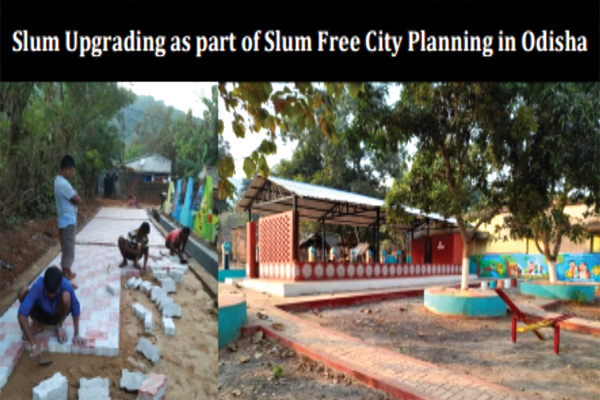
In urban areas, Civil Society Organisations (CSOs) have played a crucial role in promoting community participation in urban development programmes since the late 70s, when community engagement was being integrated into policy and action through the Five Year Plans (FYPs) for urban development. Their work has been pivotal in bringing about a substantial change at the ground level while simultaneously affecting the national policy frameworks.
Numerous civil society organisations are actively working to strengthen community-based organisations in urban poor settlements to improve access, usage and control over WSH services and infrastructure, enabling sustainable WSH initiatives. Community engagement has also led to stronger accountability mechanisms, and witnessed the emergence of women and youth leadership in urban poor neighbourhoods.
Given its historical impact, community participation has become a fundamental theme driving Urban WSH programmes in communities across Indian cities.
There is greater acknowledgement and inclusion of participatory approaches in national programmes and policies such as the Swachh Bharat Mission (Urban). For instance, the Swachh Bharat Mission and Deendayal Antyodaya Yojana-National Urban Livelihoods Mission (DAY-NULM) convergence guidelines1 of 2018 proposed the engagement of urban collectives for work across the sanitation value chain.
This was put forward as a potential solution for involving communities directly in the usage, uptake and sustenance of infrastructure created under the Swachh Bharat Mission (Urban). Additionally, the convergence of efforts with NULM proved to be a significant milestone for driving inclusion of vulnerable communities by generating livelihoods and empowering vulnerable groups.
Powerful Stories of Community Engagement in Indian Cities
Given the significant emphasis on integrating community engagement models within service delivery, India is home to key best practices which can be replicated and scaled across states. Odisha is a key frontrunner state where community engagement models have reflected deep impact amongst communities.
Project Nirmal² implemented in the Angul and Dhenkanal slums of Odisha, is a stellar example of inclusion through community participation. With the goal of enabling community-centric mobilisation processes to improve WSH practices, generate sanitation-relation demands, and ensure community participation planning and decision- making at the slum and ward level, Project Nirmal formed Slum Sanitation Committees (SSCs) as community-based organisations.
Each SSC had 9–15 members, with half the members being women, and including representatives for slum leaders, youth groups, Mahila Aroygya Samitis (MASs) and Self Help Groups (SHGs). Additionally, Anganwadi workers (AWWs) and Accredited Social Health Workers (ASHAs) were also members of SSCs. Since 2018, Mahila Arogya Samitis (MASs), have also been working at the community level on issues of health and hygiene, under the National Urban Health Mission, with a focus on Faecal Sludge and Septage Management (FSSM).
The SCCs played an instrumental role in generating awareness around both personal and collective hygiene including handwashing, how to use toilets and keeping them clean using disinfectants, promoting menstrual hygiene etc. SSCs promoted sanitation awareness in multiple ways, including organising events on specific days such as Environment Day, Sanitation Day, Water Day, Handwashing Day and Toilet Day. Additionally, SSCs motivated people to clean their toilet tanks regularly and avoid employing manual cleaning of septic tanks. They were also instrumental in disseminating information about other government schemes such as pension or housing.
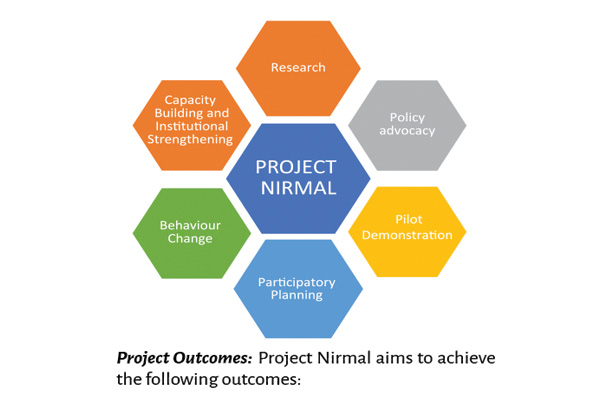
Project Nirmal, implemented by a technical support partner in Odisha, Centre for Policy Research played a facilitating role by convening open meetings in each slum to discuss the necessity of forming SSCs, identifying sanitation-related issues in open meetings and prioritising issues to be addressed by SCCs, among other supportive activities.
Women SHGs (WSHG) were also beneficial in the state to engage with communities. They were first oriented on what to communicate and how to use multiple communication channels to convey the key messages. Key players working in the state such as CPR and EY, play an important role in supporting WSHGs through awareness generation about FSSM, motivating MAS members in this work, and mentoring them to take up entrepreneurship activities in sanitation in the focus implementation cities of Behrampur and Bhadrak. Ultimately, WSHGs in Odisha have been among the main communicators for raising awareness on key desirable behaviours and practices related to sanitation in Odisha.
How Community Participation Can Help India Achieve Its Sanitation Goals By 2030
The impact of community participation in WSH related outcomes is significant. When effectively implemented, community engagement not only leads to improved service delivery and higher awareness amongst communities, but also leads to their empowerment through livelihood opportunities. Creating community participation platforms represents voices of communities through active engagement processes. By creating an ecosystem to enable agency and representation, communities also begin to find solutions for the delivery of not just WSH services but also for the provision of housing, electricity and social security schemes.
Community-led WSH systems have also inspired governance to be more accountable and responsive to community requirements. Finally, community engagement simultaneously mitigates the risk of top-down practices and also establishes the community as the primary stakeholder in the intervention. Therefore, in order to ensure effective, inclusive, equitable and sustainable WSH for all stakeholders in urban India by 2030, community participation is indispensable.
Views expressed by – Anju Dwivedi, Associate Fellow, Centre for Policy Research (CPR) & Member, NFSSM Alliance
Note: CPR is a member of the National Faecal Sludge and Septage Management (NFSSM) Alliance, a collaborative body driving the discourse of Faecal Sludge and Septage Management (FSSM) in India.















